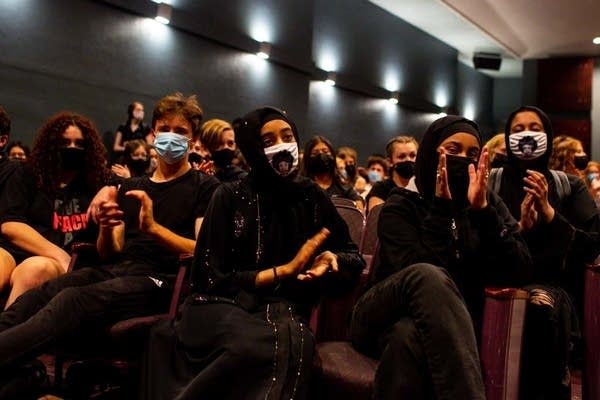How do you center young Black voices in conversations about racism? One Twin Cities high school is trying

Go Deeper.
Create an account or log in to save stories.
Like this?
Thanks for liking this story! We have added it to a list of your favorite stories.
Ever since George Floyd was murdered by a white Minneapolis police officer a year ago Tuesday, Ezra Hudson, a junior at St. Louis Park High School, has become afraid to drive.
“For me personally as a Black male, I feel like it’s been a lot of trauma this past year,” said Hudson, 16. “Just a lot of fear for my life and my brother’s life and my dad, all the extra conversations with my mom as I’m driving. I just got my driver’s license, so she’s worried about me now.”
Hudson confessed his concerns at an open mic in front of hundreds of students at his high school auditorium this week. After he shared his story, other students spoke up:
What if I’m just walking on the street and I happen to fit a description? I think about it a year later. There’s so much trauma.
Turn Up Your Support
MPR News helps you turn down the noise and build shared understanding. Turn up your support for this public resource and keep trusted journalism accessible to all.
It’s always being scared that the people around you are racist. Just that constant fear that your teacher probably doesn’t like you because of your color.

For Evan Nelson, 18, the most routine rituals now carry an element of trepidation.
“I’m scared to walk home from school, I’m scared to go out to eat, to go shopping,” said Nelson, a senior who is also Black. “It just worries me because our skin color is a threat.”
In the year since Floyd’s killing, a flood of uncomfortable conversations about race and racism have been forced into the open — including Minnesota classrooms. At St. Louis Park High School, students of color are leading the discussion, inviting their teachers and classmates to listen.
The stories at Tuesday’s event went on for more than an hour. At the end, they held a 9-and-a-half-minute silent pause to remember the period of time Derek Chauvin knelt on Floyd’s neck outside a convenience store in Minneapolis.
Hudson, a member of the group SOAR, which stands for Students Organized for Anti-Racism, knew it might be an uncomfortable stretch of time to stay quiet. But that discomfort was the whole point.

Many students used the open mic to say they had been hungry for something like this, and they wished it was something that was talked about more — and not just at school assemblies but in algebra, geometry and social studies classes.
“Things like this should be normalized,” Hudson said after the open-mic event. “I feel like the normalization of conversations about race is the biggest piece to eliminating many of the racist issues we have in this country.”
SOAR members came up with the idea for the open mic memorial at one of their regular Wednesday Zoom meetings. Dr. LeeAnn Stephens, who advises the group, said they’ve formed a community — and it’s not unusual for kids to be DMing each other late into the night.

“I always cry when it comes to them because I just admire their courage,” she said. “They support one another and we’re in constant communication.”
When Stephens started advising the group several years ago, she said it had a reputation for being a place for mostly white kids. Now, the teenage leaders are from a diverse set of backgrounds and ethnicities.
“We’re very open, they ask questions, they’re very curious. And no one feels like, ‘Man I’m going to say the wrong thing,’ because so much grace is offered as well. We have to be an organization of healing and reconciliation,” she said.
But Stephens and the students she works with are not interested in a veneer of political correctness or diversity. She said making the group about authentic learning and real change is key to its success.
“Do you really want student voice that will impact and change policies and practices? Or do you want student voices to say, ‘Yeah we heard you,’ and we still go on with business as usual?” she said. “Our students are ready and wanting to have these conversations. As adults, we have to get out of the way.”
St. Louis Park High School is relatively diverse. Half of the students are white, a quarter are Black, 13 percent are Latino and 3 percent are Asian.
For Evan Nelson, who’s set to graduate in a few weeks, the SOAR group has been an island of belonging and learning in a school system that’s centered on whiteness. Nelson said Tuesday’s memorial allowed students to be honest and realize they were treasured for exactly who they are.

“Every person of color is struggling right now because they keep seeing people that look exactly like them getting murdered just because of their skin color,” Nelson said after the memorial. “It’s so draining and hard. Don’t give up. Stop staying silent. Speak for Black lives.”
Nelson and his classmates know that talking about racism can make their white classmates and teachers uncomfortable. But they’re offering an invitation: if you make space to listen, learn and be uncomfortable, there’s so much life-giving community, reconciliation, learning and growth. Letting students of color lead, they say, is worth it.
“Every school should have SOAR,” Nelson said. “In every school there’s Black people who aren’t being heard. And if you get an organization together of people of color, you will be heard. You have to stay together.”


